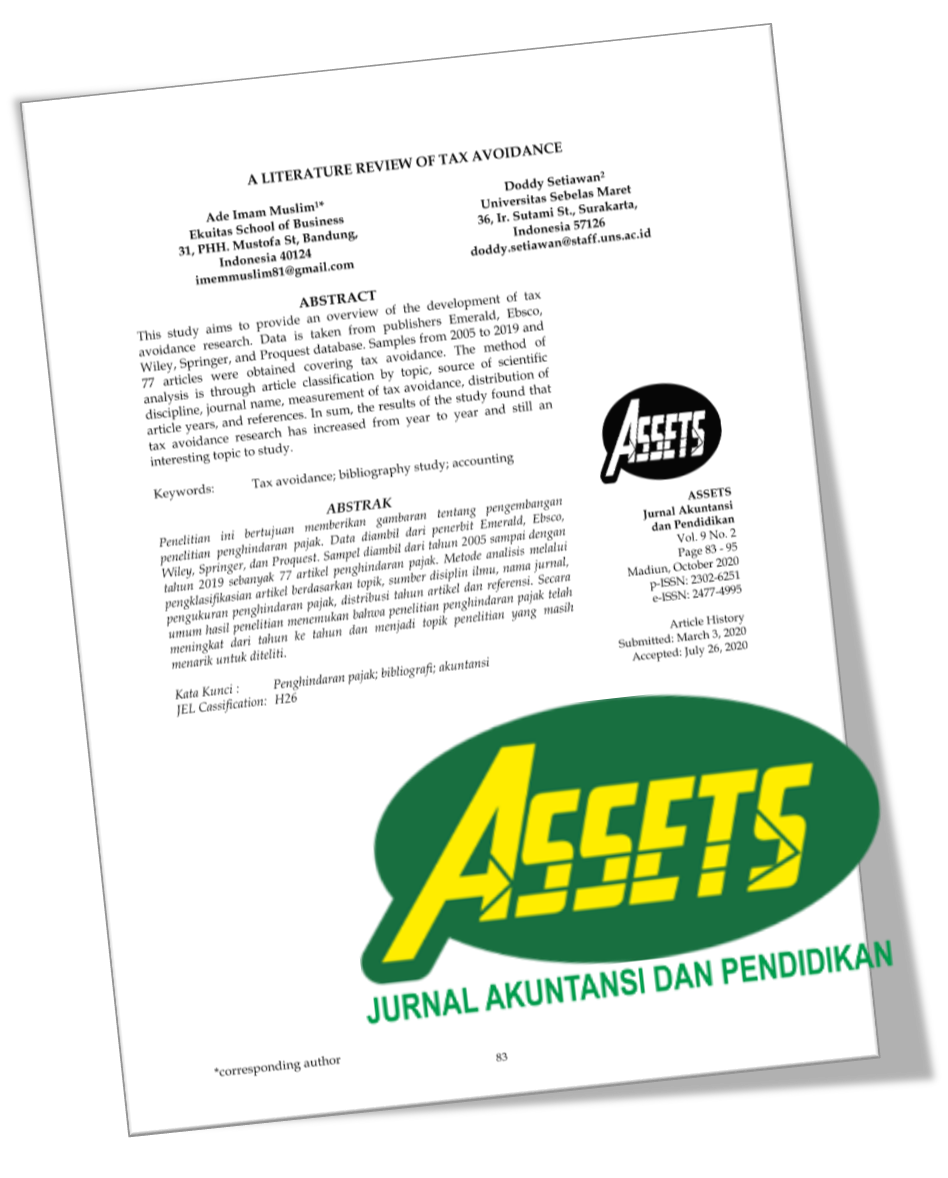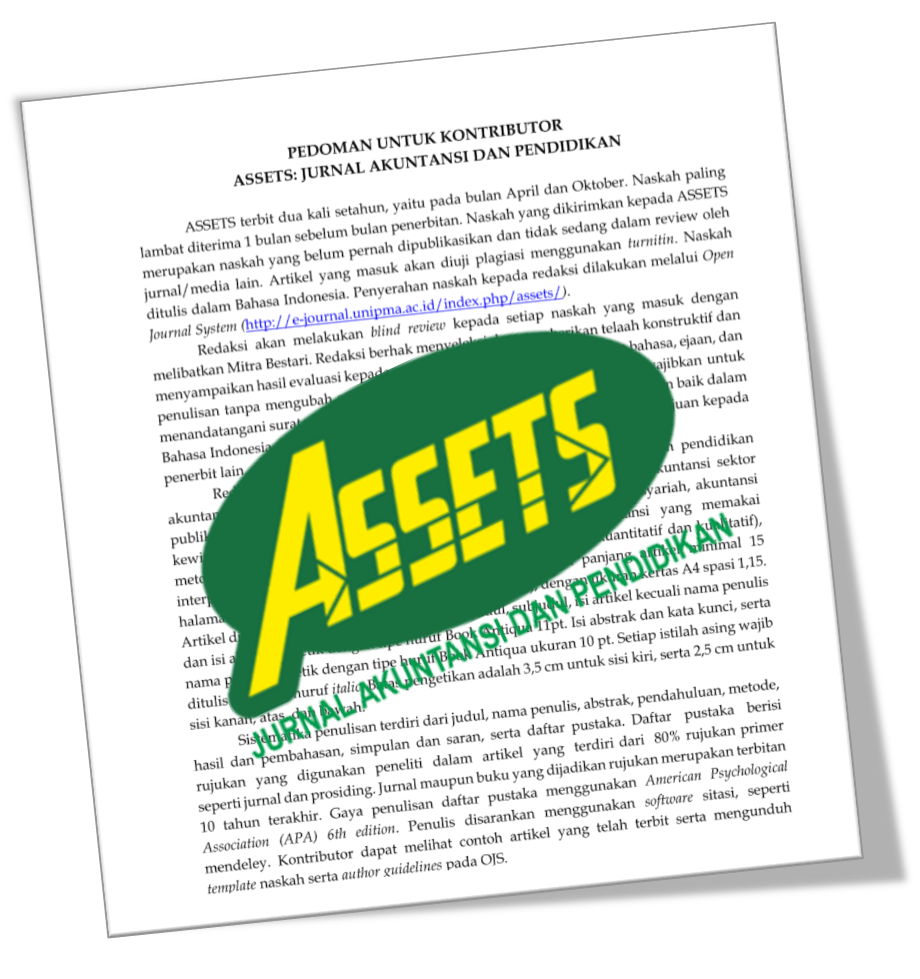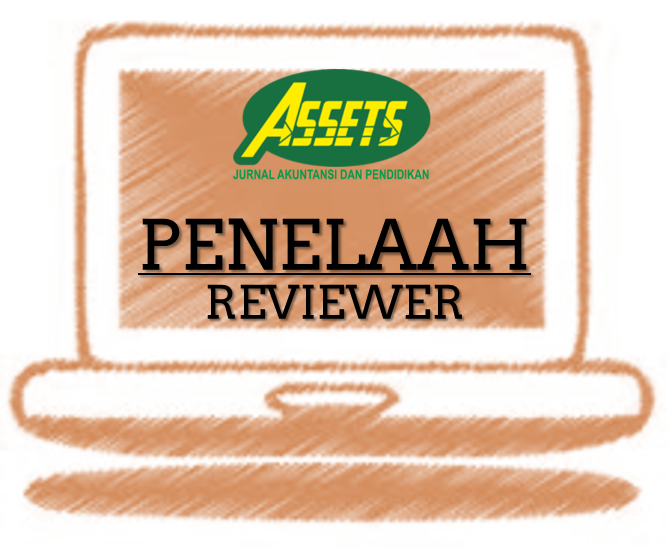INSTITUTIONAL INVESTORS, POLITICAL CONNECTION, AND SUSTAINABILITY REPORTING QUALITY: EMPIRICAL EVIDENCE FROM INDONESIA
DOI:
https://doi.org/10.25273/jap.v11i2.13102Keywords:
Institutional Investors, PInstitutional Investors, Political Connection, Sustainability Reporting Quality, Investor Institusional, Koneksi Politik, Kualitas Pelaporan KeberlanjutanAbstract
ABSTRACT
This study aims to show empirical evidence of the role of political connections in the relationship between institutional investors and sustainability reporting. With observational data of 2,425 firm years and data analysis using short-term dynamic panel data regression or GMM. This study results that political relations function as a moderating variable. In a sense, a political connection weakens the relationship between institutional investors and genuine sustainability reporting. These results indicate that although institutional investors push for the quality and consistency of sustainability reporting, political connections avoid quality sustainability reporting. The results of this study provide practical implications that allow regulators to evaluate the rules for presenting sustainability reporting information.
ABSTRAK
Tujuan penelitian ini adalah untuk membuktikan secara empiris mengenai peran Political connection dalam hubungan antara investor institusional dan pelaporan keberlanjutan. Dengan menggunakan data observasional 2.425 tahun perusahaan dan analisis data menggunakan GMM, hasil penelitian ini menunjukkan bahwa political connection berfungsi sebagai pure moderator dalam hubungan antara investor institusional dan pelaporan keberlanjutan. Hubungan politik murni melemahkan hubungan antara investor institusional dan pelaporan keberlanjutan. Hasil ini mengindikasikan bahwa koneksi politik yang lebih besar menyebabkan perusahaan menghindari pelaporan keberlanjutan yang berkualitas meskipun investor institusional mendorong kualitas dan konsistensi pelaporan keberlanjutan. Implikasi praktis penelitain ini memungkinkan regulator untuk mengevaluasi aturan penyajian informasi tentang sustainability reporting.
Â
Downloads
References
Aman, Z., & Jaafar, S. (2020). Institutional Ownership and Corporate Sustainability Reporting in Malaysia. 7th International Conference on Management and Muamalah, 2020(ICoMM), 297–305.
Bae, S. M., Masud, M. A. K., & Kim, J. D. (2018). A cross-country investigation of corporate governance and corporate sustainability disclosure: A signaling theory perspective. Sustainability (Switzerland), 10(8). https://doi.org/10.3390/su10082611
Bertrand, M., Kramarz, F., Schoar, A., & Thesmar, D. (2018). The Cost of Political Connections. Review of Finance, 22(3), 849–876. https://doi.org/10.1093/rof/rfy008
Boubakri, N., El Ghoul, S., Wang, H., Guedhami, O., & Kwok, C. C. Y. (2016). Cross-listing and corporate social responsibility. Journal of Corporate Finance, 41, 123–138. https://doi.org/10.1016/j.jcorpfin.2016.08.008
Bunea, O. I., Corbos, R. A., & Popescu, R. I. (2019). Influence of some financial indicators on return on equity ratio in the Romanian energy sector - A competitive approach using a DuPont-based analysis. Energy, 189, 116251. https://doi.org/10.1016/j.energy.2019.116251
Chan, M. C. C., Watson, J., & Woodliff, D. (2013). Corporate Governance Quality and CSR Disclosures. Journal of Business Ethics, 125(1), 59–73. https://doi.org/10.1007/s10551-013-1887-8
Cheng, B., Ioannou, I., & Serafeim, G. (2014). CORPORATE SOCIAL RESPONSIBILITY AND ACCESS TO FINANCE. Strategic Management Journal, 35, 1–23. https://doi.org/10.1002/smj
Cheng, S., Lin, K. Z., & Wong, W. (2015). Corporate social responsibility reporting and firm performance: evidence from China. Journal of Management and Governance, 20(3), 503–523. https://doi.org/10.1007/s10997-015-9309-1
Cho, C. H., Chen, J. C., & Roberts, R. W. (2008). The politics of environmental disclosure regulation in the chemical and petroleum industries : Evidence from the Emergency Planning and Community Right-to-Know Act of 1986. 19, 450–465. https://doi.org/10.1016/j.cpa.2007.03.014
Clarkson, E. B. M. (1995). A Stakeholder Framework for Analyzing and Evaluating Corporate Social Performance Author ( s ): Max B . E . Clarkson Source : The Academy of Management Review , Vol . 20 , No . 1 ( Jan ., 1995 ), pp . 92-117 Published by : Academy of Management Stable URL. The Academy of Management Review, 20(1), 92–117.
Dang, V. Q. T., So, E. P. K., & Yan, I. K. M. (2018). The value of political connection: Evidence from the 2011 Egyptian revolution. International Review of Economics and Finance, 56, 238–257. https://doi.org/10.1016/j.iref.2017.10.027
Delgado-Márquez, B. L., Pedauga, L. E., & Cordón-Pozo, E. (2017). Industries Regulation and Firm Environmental Disclosure: A Stakeholders’ Perspective on the Importance of Legitimation and International Activities. Organization and Environment, 30(2), 103–121. https://doi.org/10.1177/1086026615622028
Faccio, M. (2006). Politically connected firms. American Economic Review, 96(1), 369–386. https://doi.org/10.1257/000282806776157704
Faccio, M., Masulis, R. W., & Mcconnell, J. J. (2006). Political connections and corporate bailouts. Journal of Finance, 61(6), 2597–2635. https://doi.org/10.1111/j.1540-6261.2006.01000.x
Fama, F. E., & Jensen, C. M. (1983). Agency Problems and Residual Claims. The University of Chicago Press Journals, 26(2), 327–349.
Fan, S., & Wang, C. (2019). Firm age , ultimate ownership , and R & D investments. International Review of Economics and Finance. https://doi.org/10.1016/j.iref.2019.11.012
Fernández-Gago, R., Cabeza-GarcÃa, L., & Nieto, M. (2018). Independent directors’ background and CSR disclosure. Corporate Social Responsibility and Environmental Management, 25(5), 991–1001. https://doi.org/10.1002/csr.1515
Freeman, R. E. (1999). Response: Divergent Stakeholder Theory. The Academy of Management Review, 24(2), 233. https://doi.org/10.2307/259078
Habib, A., Muhammadi, A. H., & Jiang, H. (2017). Political connections and related party transactions: Evidence from Indonesia. The International Journal of Accounting, 13(1), 1–19. https://doi.org/10.1016/j.intacc.2017.01.004
Hu, H. W., & Sun, P. (2018). What determines the severity of tunneling in China? Asia Pacific Journal Management, 36(1), 161–184. https://doi.org/10.1007/s10490-018-9582-z
Jennings, W. W. (2005). Further Evidence on Institutional Ownership and Corporate Value. Advances in Financial Economics, 11, 167–207. https://doi.org/10.1016/S1569-3732(04)11008-6
Jensen, M. C., & Meckling, W. H. (1976). Theory of the Firm : Managerial Behavior , Agency Cost And Ownership Structure. Journal of Financial Economics, 3, 305–360. https://doi.org/10.1016/0304-405X(76)90026-X
Katmon, N., Mohamad, Z. Z., Norwani, N. M., & Farooque, O. Al. (2017). Comprehensive Board Diversity and Quality of Corporate Social Responsibility Disclosure: Evidence from an Emerging Market. Journal of Business Ethics, 157(2), 447–481. https://doi.org/10.1007/s10551-017-3672-6
Lee, J., Kim, S. J., & Kwon, I. (2017). Corporate social responsibility as a strategic means to attract foreign investment: Evidence from Korea. Sustainability (Switzerland), 9(11), 1–11. https://doi.org/10.3390/su9112121
Li, J., Xia, J., & Zajac, E. J. (2018). On the duality of political and economic stakeholder influence on firm innovation performance: Theory and evidence from Chinese firms. Strategic Management Journal, 39(1), 193–216. https://doi.org/10.1002/smj.2697
Masud, M. A. K., Bae, S. M., Manzanares, J., & Kim, J. D. (2019). Board directors’ expertise and corporate corruption disclosure: The moderating role of political connections. Sustainability (Switzerland), 11(16). https://doi.org/10.3390/su11164491
Masud, M. A. K., Hossain, M. S., & Kim, J. D. (2018). Is green regulation effective or a failure: Comparative analysis between Bangladesh Bank (BB) green guidelines and global reporting initiative guidelines. Sustainability (Switzerland), 10(4). https://doi.org/10.3390/su10041267
McGuinness, P. B., Vieito, J. P., & Wang, M. (2017). The role of board gender and foreign ownership in the CSR performance of Chinese listed firms. Journal of Corporate Finance, 42, 75–99. https://doi.org/10.1016/j.jcorpfin.2016.11.001
Mulyati, S., & Mulyana, B. (2021). The Effect of Leverage, Firm Size, and Sales Growth on Income Smoothing and Its Implication To the Firm Value (Study on State-Owned Companies Listed in Indonesia Stock Exchange 2016-2019). International Journal of Engineering Technologies and Management Research, 8(9), 9–18. https://doi.org/10.29121/ijetmr.v8.i9.2021.1015
Perrault, E., & Clark, C. (2016). Environmental Shareholder Activism: Considering Status and Reputation in Firm Responsiveness. Organization and Environment, 29(2), 194–211. https://doi.org/10.1177/1086026615571939
Roberts, R. W. (1992). Determinants of corporate social responsibility disclosure: An application of stakeholder theory. Accounting, Organizations and Society, 17(6), 595–612. https://doi.org/10.1016/0361-3682(92)90015-K
Sekali, J., & Bouzahzah, M. (2019). Financial Development and Environmental Quality : Empirical Evidence for Morocco. International Journal of Energy Economics and Policy, 9(2), 67–74. https://doi.org/https://doi.org/10.32479/ijeep.7266
Zhao, R. Y. M. (2015). Sustainability and firm valuation: an international investigation. International Journal of Accounting and Information Management, 23(3), 289–307.
Downloads
Published
Issue
Section
License
Perjanjian Lisensi dan Hak Cipta
Saat mengirimkan naskah ke jurnal, penulis menyatakan bahwa:
- Mereka diberi wewenang oleh rekan penulisnya untuk masuk ke dalam perjanjian ini.
- Karya yang dimaksud belum pernah diterbitkan secara resmi sebelumnya, kecuali dalam bentuk abstrak atau sebagai bagian dari kuliah, resensi, tesis, atau overlay jurnal yang diterbitkan.
- Karya yang dimaksud tidak sedang dipertimbangkan untuk diterbitkan di tempat lain,
- Publikasi karya yang dimaksud telah disetujui oleh semua penulis dan oleh otoritas yang bertanggung jawab - secara tahu sama tahu atau eksplisit - dari lembaga tempat pekerjaan itu dilakukan.
- Mereka mengamankan hak untuk mereproduksi materi apa pun yang telah diterbitkan atau dilindungi hak cipta di tempat lain.
- Mereka menyetujui lisensi dan perjanjian hak cipta berikut.
Hak Cipta
Penulis yang menerbitkan dengan ASSETS: Jurnal Akuntansi dan Pendidikan menyetujui persyaratan berikut:
- Penulis mempertahankan hak cipta dan memberikan jurnal hak publikasi pertama dengan karya yang secara bersamaan dilisensikan di bawah Lisensi Atribusi Creative Commons (CC BY-SA 4.0) yang memungkinkan orang lain untuk berbagi karya dengan pengakuan kepenulisan karya dan publikasi awal di jurnal ini.
- Penulis dapat masuk ke dalam pengaturan kontrak tambahan yang terpisah untuk distribusi non-eksklusif dari versi jurnal yang diterbitkan dari karya tersebut (misalnya, mempostingnya ke repositori institusional atau menerbitkannya dalam sebuah buku), dengan pengakuan publikasi awalnya di jurnal ini.
- Penulis diizinkan dan didorong untuk memposting karya mereka secara daring (misalnya di repositori institusional atau di situs web mereka) sebelum dan selama proses pengiriman, karena dapat menghasilkan pertukaran yang produktif, serta kutipan lebih awal dan lebih besar dari karya yang diterbitkan.
License and Copyright Agreement
In submitting the manuscript to the journal, the authors certify that:
- Their co-authors authorize them to enter into these arrangements.
- The work described has not been formally published before, except as an abstract or part of a published lecture, review, thesis, or overlay journal.
- That it is not under consideration for publication elsewhere,
- That its publication has been approved by all the author(s) and by the responsible authorities – tacitly or explicitly – of the institutes where the work has been carried out.
- They secure the right to reproduce any material already published or copyrighted elsewhere.
- They agree to the following license and copyright agreement.
Copyright
Authors who publish with ASSETS: Jurnal Akuntansi dan Pendidikan agree to the following terms:
- Authors retain copyright and grant the journal right of first publication with the work simultaneously licensed under a Creative Commons Attribution License (CC BY-SA 4.0) that allows others to share the work with an acknowledgment of the work's authorship and initial publication in this journal.
- Authors can enter into separate, additional contractual arrangements for the non-exclusive distribution of the journal's published version of the work (e.g., post it to an institutional repository or publish it in a book), with an acknowledgment of its initial publication in this journal.
- Authors are permitted and encouraged to post their work online (e.g., in institutional repositories or on their website) before and during submission, as it can lead to productive exchanges and earlier and more extraordinary citations of published work.

ASSETS: Jurnal Akuntansi dan Pendidikan is licensed under a Creative Commons Attribution-ShareAlike 4.0 International License.










